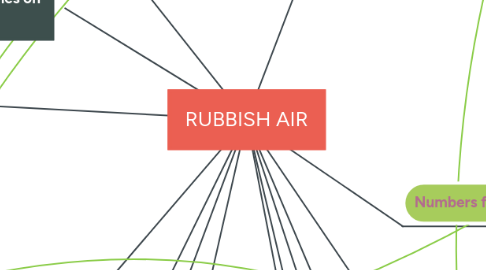
1. cabin crew
1.1. data (kinda)
1.2. training
2. companies that advise airlines on waste reduction
2.1. MNH Sustainable Cabin Services
3. Rising passenger numbers = more waste // Could their greenhouse gases be cut by reducing waste?
3.1. data
4. EU animal health legislation
4.1. drawn up as a reaction to diseases like foot and mouth, dictates that all catering waste arriving from outside EU borders be treated as high-risk and incinerated or buried in deep landfill. A coffee cup from the US, for example, will be treated as hazardous waste because it might have had milk in it. Donating uneaten food to charity is impossible.
4.1.1. a more rational approach is needed
4.1.2. It isn't impossible in Australia: OzHarvest
5. costs
5.1. $500m (£400m)
5.1.1. growing disposal costs
5.2. If they can be persuaded to focus on a product’s full life cost, rather than unit price, then investing in more durable headsets or blankets and ditching disposables starts to make sense
6. waste
6.1. disposable products -- from wine bottles to plastic toothbrushes
6.1.1. solution: recycling
6.1.1.1. Emirates: An average of 1.7 million kilograms of aluminum cans, waste paper/cardboard, glass bottles, aluminum foil and plastic is collected annually (Emirates).
6.1.1.1.1. data
6.2. food
6.2.1. solution: loading exactly the right amount
7. solutions
7.1. digesting data
7.1.1. By tracking passengers' online data -- from location to income, spending habits and consumption -- airlines can predict passenger behavior.
7.1.2. By tracking consumption over time, airlines could predict which meal type you're most likely to order on-board -- and adjust stock lists accordingly.
7.2. Pay as you go
7.2.1. LCC (Lowcost Carriers)
7.2.2. By providing this system -- where passengers buy meals using an app or website -- airlines can simultaneously meet demand and minimize waste
7.2.3. Pre-ordering of meals also has obvious catering advantages. It lowers costs and weight on board, which translates to lower fuel burn.
7.2.4. This approach is becoming more widely embraced by full-service international airlines as well, with the likes of SAS, Japan Airlines, Singapore Airlines and Qantas creating online and mobile booking portals.
8. Airlines that have programs to tackle their waste problem
8.1. IBERIA
8.1.1. data
8.1.2. introduce cabin crew training
8.1.3. airline behind European Union's "Life + Zero Cabin Waste" plan
8.2. SWISS
8.3. United Airlines
8.3.1. switched to compostable paper cups and last year began donating unused amenity kits to homeless and women’s shelters – it expects to divert more than 27 tonnes-worth by the end of the first year.
8.4. Virgin
8.4.1. set up a system for recycling all parts of its headsets, including ear sponges, which are used as flooring for equestrian centres.
8.5. Qantas
8.5.1. is combining its charity donation envelope with its headset package, cutting one polythene bag per passenger per flight.
8.5.2. has begun to use recycled materials for its packaging as well as plastic-free headsets. The airline has also partnered with OzHarvest -- a food rescue organization that collects 87 tons of food every week across Australia -- to donate unused perishables to those in need. With these changes, Qantas estimates that it will divert 350 tons of waste from landfills annually.
8.5.2.1. OzHarvest
8.5.2.2. data
8.6. SAS
8.6.1. Peter Lawrance, head chef of Scandinavian Airlines (SAS): "Based on history of sales and other flight information on specific routes, we are implementing our own developed tool to increase diverse loading instructions to match and predict the passenger needs on every specific route,"
8.6.2. In its 2016 Sustainability Report, SAS outlined a few ongoing initiatives: locally sourced food, with a "nose-to-tail" approach to limit waste; access to recycling on board; lightweight reusable plates and silverware; and recyclable or combustible disposable packaging.
8.6.2.1. Sustainability Report
8.7. Emirates
8.7.1. Emirates has also introduced new measures to combat waste, including recycling facilities on board, for easy sorting of glass, plastic, aluminum, and paper products. In addition, the Dubai-based airline has also introduced eco-friendly blankets, made from recycled plastic bottles. The airline expects this amenity to rescue more than 12,000 tons of bottles from landfills by 2019.
8.7.1.1. data
9. Numbers from IATA (2012/2013)
9.1. airlines produced 5.2 million tons of waste last year, and will produce over 10 million tons annually by 2030.
10. airports
10.1. Heathrow and Gatwick are both targeting 70 % waste recycling by 2020
10.2. Gatwick opened an on-site waste-to-energy plant
10.3. ground handling
10.3.1. East Midlands and Gatwick airports have started tagging rubbish bags with their origin but elsewhere it’s common practice for waste from inside and outside the EU to get thrown together and processed collectively as international catering waste.
11. Comparison: Restaurants
11.1. Solution: Donating food to charity
11.1.1. Aessbar, Olio, etc.
12. catering
12.1. Emirates prepares 180'000 meals a day
12.1.1. 55 million meals a year
12.1.1.1. Five-hundred chefs cook the huge array of fresh food before it's frozen in super-fast blast freezers; 58 million bread rolls; 15 million croissants; 13 million eggs; 4,300 tons of chicken; 1,100 tons of lamb; 3.6 tons of lobster.
12.2. Emirates: Three million items of dirty equipment are sorted and cleaned -- each day.
12.2.1. As soon as the trollies are received from the aircraft they're segregated between food, beverages and Duty Free and the equipment is washed in a series of specially designed machines managed by 500 workers.
13. problems
13.1. sheer scale
13.1.1. difficult to forsee how many people will actually be eating
13.1.1.1. solution: A finely tuned computer system which can customize catering to changing needs
13.2. international health regulations
13.3. varying governmental waste policies
13.4. space constraints and other problems because in the air
13.4.1. Airlines must plan for food safety, hygiene, freshness and weight -- hence the vast amounts of plastic in every plane cabin.
